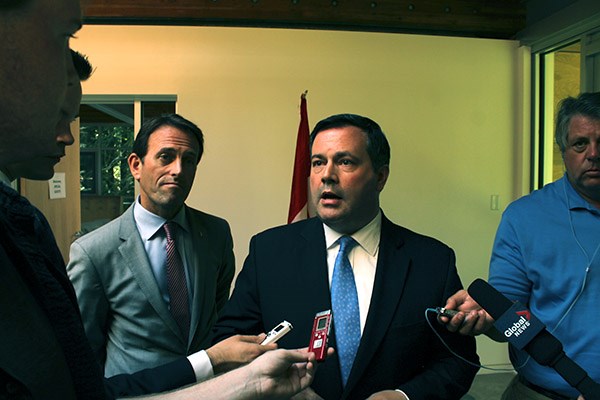Federal Minister of Employment and Social Development Jason Kenney visited the Cheakamus Centre on last Wednesday, Aug. 6, to address changes to the federal Temporary Foreign Worker Program (TFWP). The luncheon was also attended by local MP John Weston, members of the Squamish and Whistler Chambers of Commerce and regional business owners – including 30 from Squamish.
After a closed-door round-table meeting between the MPs and chambers of commerce representatives, Kenney addressed business owners concerned over the impacts of recent alterations to the TFWP.
“My armistice to employers is that they should redouble their efforts to hire Canadians,” he said. “We still have over 100,000 British Columbians who are out of work. We have a whole lot of aboriginal folks who are not in the work force. We have high youth unemployment in B.C. The challenge is for employers to give those folks a crack before they go abroad.”
Graham Young is the rafting manager of Canadian Outback Adventures and Events. He employs 15 full-time staff during the summer to run rafting trips out
of Squamish.
“It’s quite hard to find Canadian guides who have the experience level necessary to provide those safe trips,” he said, adding he uses the TFWP to bring in senior guides – people who ensure safety on the river.
“Of my operational force, about 30 per cent of them are on the TFWP, so if we get into a situation where 10 per cent of our skilled workers can be foreign workers, I’m then put in the position where I’m running a less safe company than I would be doing what I’m doing right now,” he said. “We really don’t know what we’ll do if we don’t have that access. It may be a situation where we’ll have to shrink the size of the company.”
The TFWP has been observed more carefully in recent years. In April, three MacDonald’s outlets in Victoria were blacklisted for misusing the program. The current changes to TFWP were announced June 20. The aim of these changes is to pair unemployed Canadians with job openings before employers look abroad. Among changes to be phased in are:
• Barring employers from hiring low-wage temporary foreign workers in regions where the unemployment rate is above six per cent.
• A gradual capping to 10 per cent on the number of low-wage temporary foreign workers employers can hire per work site by 2016.
• An increase in the number of inspections: one in four employers will be inspected each year.
• An increase in the application fee employers must pay to request a
foreign worker from $275 to $1,000 effective immediately.
• Fines of up to $100,000 for employers who abuse the program, starting in the fall.
The unemployment data used to determine if businesses will be barred from participating in the program is regional. The Sea to Sky Corridor is a part of the Lower Mainland South-West Region – an area which includes much of Metro Vancouver.
Chris Pettingill, volunteer chair for Squamish’s Chamber of Commerce, is pleased that the event came together.
“I talked to Mr. Kenney as well as the staff person who’s in charge of the TFWP. I think we maybe need to find some short-term solutions and ways to deal with these changes a little differently. Medium to long-term, we also need a plan about how we are going to staff our businesses.”
Pettingill recognizes the challenge for Squamish restaurants in particular.
“I know they’re really having trouble getting staff for weekend and night shifts,” he said. “These are things that we’re going to have to work through as a business community and with the government.”
Kenney added that there may be exceptions to the rules or “carving out of certain discrete, super-tight labour markets from the exclusion of low-skill workers from the food and hospitality retail sector in regions of unemployment over six per cent.
“We realize there are places, perhaps this is one, where you have this really hopping market surrounded by higher unemployment so we are prepared on a case by case basis to look at situations like that,” he said.
Squamish and Whistler Chambers of Commerce representatives plan to meet with Weston again and communicate on policy initiatives with Kenney.



